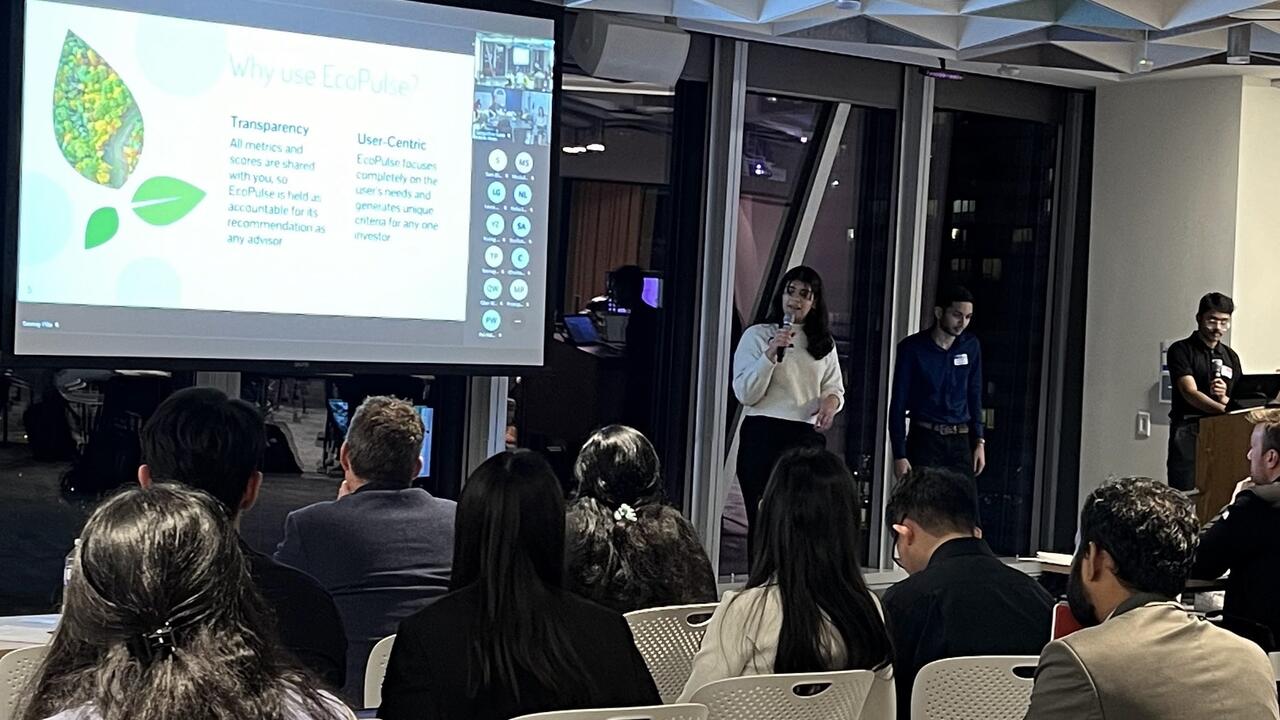
Waterloo students win GenAI competition in Toronto
From investing in the circular economy to nurturing sustainable innovations, two teams pitch game-changing ideas at AI EarthHack competition

From investing in the circular economy to nurturing sustainable innovations, two teams pitch game-changing ideas at AI EarthHack competition
By Darren McAlmont University RelationsOn January 18, two teams of Waterloo students participated in the final round of competitions at the inaugural AI EarthHack competition at Microsoft’s headquarters in Toronto. Team Cyclic Geese — comprised of three third-year software engineering students — emerged as winners of one of the two grand prizes and will receive an internship at Manulife.
The winning team’s pitch was for an application called EcoPulse, which aims to harness the power of generative AI to revolutionize the process of investing in the circular economy. It provides personalized investment recommendations by dynamically generating metrics based on individual user profiles.
The team, made up of Valerie Fernandes, Tanmay Pilla and Ekanshh Praveen are excited that the long hours of research that went into building their app was recognized by tech giants like Microsoft and the Harvard Digital Data Design Institute. “We were innovative about our use of generative AI by going beyond generating numerical data like scores and weights, but also allowing some of the criteria itself to be generated by GPT. Doing this allowed us to best leverage the creative potential of generative AI for the project,” Fernandes says.
As they progressed through the rounds of competition, they continued to refine the app to get to the winning product. Praveen recalls, “EcoPulse was initially command-line based, but as we were selected for the final round, we developed a web-interface so that users can interact with our tool easily. These changes helped us present EcoPulse as a game-changer in front of the judges at the final competition.”

From left to right: Valerie Fernandes, Tanmay Pilla and Ekanshh Praveen as they present EcoPulse in front of judges at GenAI competition in Toronto.
Besides the internship opportunity at Manulife, Pilla found unquantifiable value in the connections he was able to make during the competition. “The best part about the event was that we got to interact with students from top universities across North America and internationally,” he said. “It was great to learn what the other teams have implemented, and the potential ways I can incorporate their technologies into future projects of mine.”
Neha Lalany, a fourth-year student in the School of Accounting and Finance, and William Wang, a third-year computer science student, also competed in the final round. “Our project, SWIFT (Sustainable Workflow for Idea Filtering and Testing), is an AI-powered ideation filtration tool that streamlines the selection of sustainable ideas. SWIFT is not just a filtration tool; it's a comprehensive platform designed to enhance, accelerate and refine the process of identifying and nurturing sustainable innovations,” Lalany says. “Its combination of AI-driven analysis, real-time data integration and customizable strictness positions it as an invaluable asset for anyone looking to champion the next big idea in sustainability.”
The AI EarthHack competition was made possible through a partnership with Waterloo-based start-up DotsLive and the Digital Data Design Institute at Harvard to organize a series of GenAI Competition initiatives — AI EarthHack was the first one.
“The partnership with the Digital Data Design Institute at Harvard and the generative AI competition series are important because we want to create opportunities for many to learn how to be more creative and work more effectively using AI,” said Anferny Chen, founder of DotsLive. “As a Waterloo-based start-up founder, I feel proud that University of Waterloo students powered two finalist teams."

Read more
Fifty-six researchers receive Government of Canada funding to solve some of humanity’s most critical problems

Read more
Here are the people and events behind some of this year’s most compelling Waterloo stories

Read more
The Royal Society of Canada welcomes new fellows and members to the 2023 class of the RSC College
The University of Waterloo acknowledges that much of our work takes place on the traditional territory of the Neutral, Anishinaabeg, and Haudenosaunee peoples. Our main campus is situated on the Haldimand Tract, the land granted to the Six Nations that includes six miles on each side of the Grand River. Our active work toward reconciliation takes place across our campuses through research, learning, teaching, and community building, and is co-ordinated within the Office of Indigenous Relations.